
As she settles into her latest role as comforter-in-chief, the president's wife recalls how she heard the news and describes how her life has changed
For first lady laura bush, the morning of september 11 started out just like any other day at the White House. She got up early. There were her two dogs, Barney, a frisky black terrier, and Spot, an English springer spaniel, to walk, meetings to attend and senators to see. The president was out the big doors first, catching Air Force One for a day trip to an elementary school in Florida. Soon after, the in-laws, former President George Bush and former First Lady Barbara Bush, who had spent Monday night at the White House, hopped a private jet to Minnesota for a political speech.
The first lady was the last Bush to exit the White House on that sparkly late-summer morning. Just before 9 A.M., she was heading off to Capitol Hill, scheduled to be only the fourth first lady to testify before a congressional committee. Her mind was focused on the speech she was to deliver about early childhood education. As she stepped into a waiting car, her Secret Service agent informed her that a plane had just crashed into one of the World Trade Center towers. "Of course, at that time we thought it was just some weird freak accident," she recalls.
She didn't think terrorism until she got to the Hill. "That's when we learned that a second plane had hit," she says. "Senator [Edward M.] Kennedy met me at the door. We both agreed then that we would postpone the hearing. I went in and stayed in his office for a while. Senator Judd Gregg joined us."
While her agents and senior staff frantically worked their earpieces and cellphones to get a handle on the unfolding attacks, Laura Bush did little but sit stunned, watching the tragedy unfold on a small television in the inner sanctum of one of the GOP's arch-foes.
The world has changed over the last two weeks, and laura bush has changed with it. The former librarian from Midland, Texas, has transformed her image from the behind-the-scenes presidential wife most comparable to Mamie Eisenhower to the nation's comforter-in-chief. In numerous public appearances, she has managed to express grief with dignity and convey an impression of resilience at the same time. Last week, before a meeting with the queen of Jordan to bolster Arab-American relations, Bush sat down in the White House Map Room and talked to US weekly about her new role and the altered world in which we live.
Wearing a pair of slim black slacks, a black sweater and a loose-fitting hunter-green knit jacket, Bush, 54, looks more petite and delicate in person than she seems in pictures. She has a small of aquamarine studs in her ears. Her fingernails are unpolished. There's a gold wedding band and an oval diamond on her ring finger. The diamond is relatively new - a present to her from the president last Christmas. Previously in their 23 years of marriage, she wore only the gold band. "Bushy," as she calls her husband, never had the time, she has said, to buy her a proper engagement ring.
Bush recalls the minutes in Kennedy's office on the morning of September 11 as being a blur. "The TV was on, but we weren't watching every minute of it," she says. "I mean, we knew what was happening because people kept coming in, but we weren't watching the call she most wanted: "The president phoned as soon as he knew that it wasn't just an accident and probably as soon as he could find me," she says. "We said the same thing to each other: 'How horrible. How terrible. I'm OK. Somewhere safe. The girls are safe' "
Next, she made calls to each of her 19-year-old twin daughters. Barbara, at Yale, first heard the news on her clock radio, when the alarm woke her up. Jenna, at the University of Texas and in a different time zone, was still sleeping when the attacks occurred and was awakened with the news by a Secret Service agent. The girls were quickly moved to secure locations in their separate cities. Both girls, according to the president were "freaked." Bush did her best to reassure them. "I talked to them to make sure they were fine and to tell them I was fine," she says. Then she dialed a number in Midland that she knows by heart, to get some comfort for herself. "I called my mother to tell her I was fine," she says. "But the fact is, I was calling her to hear her voice to be reassured myself."
From that point on, Bush spent the afternoon like most other Americans, glued to the television. "Horror," she recalls slowly, trying to describe her feelings. "Unbelievable sadness as we watched those buildings fall, and you know, you knew what happened to all those people inside. Everyone had anxiety and uncertainty, not knowing if this would happen all over the country."
The first lady was perhaps more at ease than the average American because her agents were receiving news before it was reported on television. "I guess we weren't that worried that something would happen in Houston or L.A.," she recalls. "Certainly, in that first part of the day, we didn't know. Then, after some time, we started hearing from our agents that most of the planes had been accounted for, fairly early in the day, I think, before they really started announcing it on television. So at some point we started feeling reassured that it wasn't going to happen again that day."
At around 4 P.M., her security detail decided it was safe to take Bush back to the White House. She finally saw her husband late in the afternoon, in a secure room with Vice-President Dick Cheney and his wife, Lynne Cheney. The reunion with "Bushy" was not private. "I know the Cheneys were in the room. It didn't seem like we were the only ones there," she says. "We hugged, of course. We were really glad to see each other, but also the enormity of what had happened in our country had really sunk in by then, and so we just comforted each other."
Later that evening, they tried to contact George H. W. Bush and Barbara Bush. They knew that George W.'s parents had been diverted from their course to Minnesota, but like many other Americans, the president could not reach his own parents, because, Bush says, he had only a cellphone number for his father, and the wireless system was overloaded.
The following morning, the first lady started hearing from her girlfriends in Texas. She communicates only via telephone or fax, not e-mail. Because her friends thought she was too busy to talk on the phone, they faxed messages of concern and prayer to her in the private residence.
The first lady is reserved about the details of how she and the president are dealing with the crisis in private. She says she wants to preserve a sense of continuity within the household and project the same to the country. By most accounts, she seems to be succeeding. During his recent New York visit, the president alluded to his wife's determination when he answered a question from a World Trade Center rescue worker about his family. "Freaked out, the girls are," he replied. "Wife's OK. She understands we're at war - got a war mentality."
As to whether the private conversations between the president and his wife have changed, Bush says that she and her husband are discussing national security more than they used to. "We talk about it like everyone else in America. We are all involved in that sort of discussion, more than we were before," she says. "But in general, we are like every other married couple. We talk about what we're going to do on the weekend, what our plans are for the evening and what our kids are doing."
Bush admits to feeling some degree of maternal anxiety over the fact that her children are so far from home. "It's hard. It's very hard," she says. "I haven't seen them. But like every other family, we are talking to them more now. And it's not just us calling them, they are calling in more now." She says there really hasn't been a marked "before" and "after" transformation in the domestic White House routine. Getting back to daily activities, the Bushes went out last week with two friends to a suburban Washington, D.C., Tex-Mex restaurant, where the president indulged his taste for enchiladas and nonalcoholic beer. "We continue to have a very normal life here," she says. "We want to encourage Americans to go about their lives in a normal way. But I do think everyone's lives changed in the sense that we became very aware of what really does matter. And the first people we called are the people that really matter."
Since the strikes, the White House cabinet has come together more frequently and in more intimate settings. The weekend after, for example, a war cabinet met at Camp David. At the end of a day of somber brainstorming, the group came together around the piano in the living room. Attorney General John Ashcroft played, and National Security Advisor Condoleezza Rice, a concert pianist herself, sang hymns and patriotic American songs. The first lady says the music soothed the stressed-out crew. "It was really comforting and relaxing to listen to them," she says. "And I know it was really comforting for them because music is an important part of both their lives."
The first lady says she has grown closer to Rice, Secretary of State Colin Powell's wife, Alma, and Lynne Cheney. Rice, because of her position, had often accompanied the Bushes to Camp David on weekends before September 11, and she has been a ubiquitous presence around the president since. "I love Condoleezza Rice!" the first lady says. "I see her more than any other cabinet member. I really love to be with her. One of the great things for me about the job she has is that I've had a chance to get to know her."
Laura bush has become a national symbol of resilience, and she has stepped into her new role without hesitation. She was the steadying hand behind her husband when he visited burn victims from the Pentagon. She also served as the official mourner at a variety of memorials. At the service commemorating the hijacked jet that crashed in a Pennsylvania field, she recited lines from poet Kahlil Gibran, in reference to the final cellphone calls of the passengers who ultimately overwhelmed their hijackers and forced the plane into the ground instead of a target. "Love knows not its own depths until the hour of parting," she read. In the Pennsylvania field, Bush also urged mourners to remember the last goodbye of one passenger, who told his family that he would see them again.
Two days after the terrorist attacks, a very calm Laura Bush appeared on the morning TV shows. Smiling reassuringly and speaking in an even tone, she urged Americans to try to help their children feel safe again. "They need their parents to give them a lot of hugs," the first lady said.
A week after the attacks, she traveled to Chicago to appear on Oprah Winfrey's talk show. The two women held hands through most of the broadcast. Bush again urged parents to talk to and listen to their children. "It's very reassuring for children to hear their parents' voices," she said. "Of course, we can't explain terrorism, you know, we really can't," she added. "It's just a horrible, evil thing."
Bush's tight circle of Texas girlfriends has often described her as a woman who doesn't like to dwell on difficulties. Her behavior since the attacks has proved to be true. She has tried to address the national grief and fear without losing sight of her primary focus, which remains promoting education.
She told US Weekly that she was personally most moved by the stories she heard from the teachers of P.S. 234, the New York primary school that's closest to Ground Zero. "The courage those teachers showed, and the impact [the attack] had on them . . .." She pauses. "They are still dealing with what happened, and not only are they dealing with themselves but also with the children in their schools who they are comforting. I think we have to ask ourselves, Who is comforting our teachers? Who helps them as they go back to school, and who helps them deal with their own uncertainty? We need to be the ones who comfort teachers.
"If there is some good that comes out of this - and I really hope and pray that there will be - it is that people will focus on what's really important," she continues. "I think more people will look for jobs that they find fulfilling."
For her own piece of mind, Bush says, she reads. "I immediately turned to books," she says. "I love mysteries. I have ever since I started reading Nancy Drew years ago. They have always been a great diversion to me." The weekend before the terrorist attacks, she had hosted the National Book Festival in Washington, D.C. Mystery author Sue Grafton gave the first lady her latest novel, P is for Peril, which Bush plowed through in the days and nights after September 11. "I read [Grafton's] book very quickly, and I gave it to Alma Powell that first weekend [at Camp David when] we were all together." Her staff has to fetch a bag of safety pins to help make her loose jacket fit a bit better. She leans stiffly against a plastic chair and poses for the camera with the expression of one who has done the same thing many times and is neither nervous nor terribly comfortable. After 10 minutes of flashing bulbs, she asks whether she might not look better sitting down in an overstuffed chair nearby. When no one agrees, she continues to lean on the hard plastic, smiling gamely.
The first lady says that the attacks have transformed a key aspect of what most Americans, and perhaps the rest of the world, have come to regard as the hallmark of American popular culture: celebrity worship. "Now the heroes are the celebrities ― the firefighters, the teachers, the people who sacrificed their lives to save other people," she says. "The ordinary people who do extraordinary things. All the people who gave blood, who made cookies for the firemen, who wrote letters - that is where we see the true character of our country."
She left the East Garden in a hurry, removing safety pins herself while she walked. In another wing of the White House, the queen of Jordan was waiting to meet her.


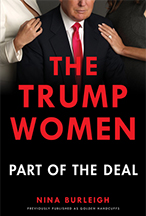
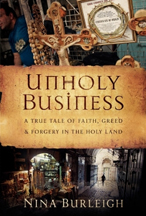
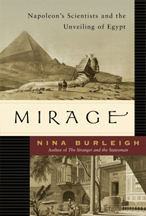

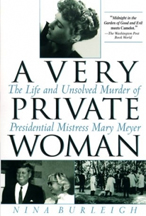
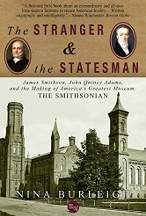

Leave a comment